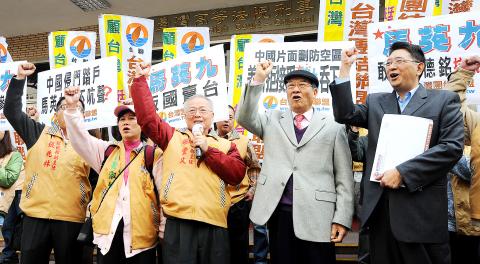|
TSU sues Ma over China ¡¥inaction¡¦
By Rich Chang / Staff reporter

Taiwan Solidarity Union Chairman
Huang Kun-huei, second right, and his supporters hold up signs and chant slogans
outside the Taiwan High Court in Taipei yesterday, saying they have new evidence
that President Ma Ying-jeou has committed treason by allowing Chinese aircraft
to invade Taiwan¡¦s airspace over the Diaoyutai Islands.
Photo: Liu Hsin-de, Taipei Times
The Taiwan Solidarity Union (TSU)
yesterday filed charges against President Ma Ying-jeou (°¨^¤E), alleging that his
¡§inaction¡¨ after China claimed a broad air defense identification zone in the
East China Sea has compromised national security.
TSU Chairman Huang Kun-huei (¶À©ø½÷) and party officials brought the charges to the
Taiwan High Prosecutors¡¦ Office, accusing Ma of the crime of abetting ¡§foreign
aggression.¡¨
Huang argued that the Ma administration¡¦s lack of response to China¡¦s air zone
demarcation, which encompasses waters and islets claimed by Taiwan, indicates a
lack of loyalty on Ma¡¦s part.
He contrasted the government¡¦s muted response with strong protests and bold
actions by the US, Japan and South Korea.
Ma¡¦s attitude has led to the international misconception that Taiwan is part of
China, and not a sovereign state, Huang said.
He added that Ma¡¦s diplomatic strategy of working with China to counter the
Japan-US alliance was a big mistake.
Following China¡¦s sudden proclamation of the air defense zone, Ma said that the
establishment of the zone does not affect Taiwan as it is not related to either
territorial sovereignty or air space rights.
Yesterday¡¦s suit is not the first time Huang has tried to take Ma to court.
In October 2011, he filed charges of treason against Ma and
then-secretary-general of the National Security Council Su Chi (Ĭ°_), arguing
that they had fabricated the so-called ¡§1992 consensus¡¨ and thereby endangered
national security.
Prosecutors responded to that case only last month, saying there was no need for
further investigation because the charges were ¡§not related to criminal
[activity].¡¨
Huang claimed prosecutors had intentionally put off dealing with the case.
The ¡§1992 consensus¡¨ refers to a supposed understanding reached between
Taiwanese and Chinese representatives in 1992, under which both sides claim to
have acknowledged that there was ¡§one China,¡¨ with each side having its own
interpretation of what ¡§one China¡¨ means.
The Democratic Progressive Party insists that the ¡§1992 consensus¡¨ does not
exist.
|
![]()
![]()
![]()